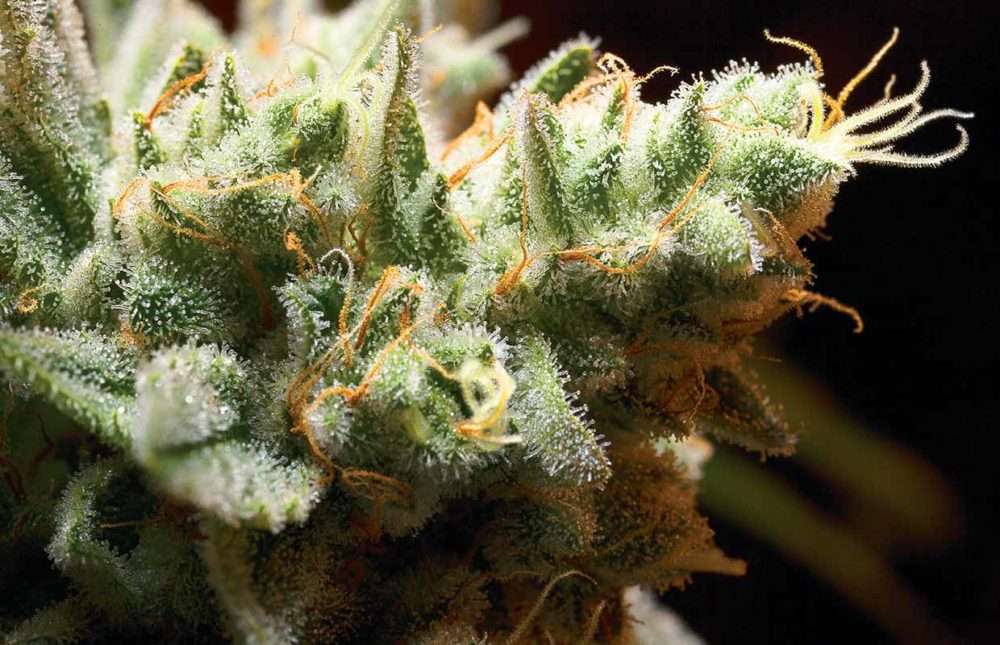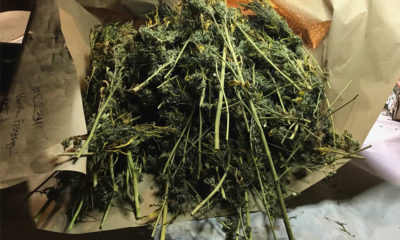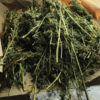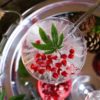Gold Seal: San Francisco Growers Look Towards the Light
Gold Seal SF is pinning its future on quality and compliance
I’m at a warehouse grow on the industrial outskirts of San Francisco — inside a metal shipping container that’s been converted into the grow room for a massive pheno hunt — and I’m practically suffocating on a cacophonous cloud of competing terpene profiles. There’s barely enough room to shuffle past the dense indoor forest of pungent plants (more than 100 all in full, sticky, aromatic bloom) and as I do, robust colas brush against my beard, catch on the buttons of my shirt and drag against the denim of my jeans, painting my body in their aggressive fragrance.
Leading the way is Neil Dellacava, co-owner and co-founder of Gold Seal SF, a boutique cannabis company growing some of the tastiest and most potent flowers in a city with no shortage of quality crops. As we slowly work our way to the far end of the thick tangle of green, he ticks off evocative pheno names like “Mangosteen” and occasionally stops to show me an especially promising candidate.
“The future is in the genetics,” he says. “The most important thing we want to do is develop our strains and grow quality weed; if it doesn’t look good, it doesn’t go out.”
“Good” is a distinct understatement for how these plants look — each one a sparkling, trichome-dazzled bud porn centerfold in the making, but Dellacava eyes them with a hypercritical lens, finding flaws in nearly each one — too much stretch, not enough density, not “loud” enough.
He has a clear vision of what he’s looking for, and he knows most of these plants won’t live up to that ideal: This test batch represents two or three testers from 60 distinct phenos of more than 20 strains — by the end of the process, all but eight plants will have been eliminated.
But like most pheno hunters, Gold Seal follows “Highlander” rules; ultimately, “there can be only one.”

Dellacava is a San Francisco native with a nearly lifelong passion for cannabis and years of professional involvement in the city’s ever-changing market.
“I grew up in Presidio Heights and I went to private school. I’m not from the Sunset District, I’m not a Cookies guy,” he said. “But I always had good weed. When I went down to LA for college, I got my card when I was 18 and I always knew I wanted to be a part of the cannabis industry.”
Alongside Dellacava, the leadership at Gold Seal includes new partner Tyson Graham and co-founder Aaron Flynn, who also serves as the president of the San Francisco chapter of the Cannabis Grower’s Association and the head of the Leadership team for the San Francisco Cannabis Licensing Group. Flynn is a business major with a laid back demeanor and the imposing physique of a Marine Corps veteran.
“I grew up in Minnesota, in a pretty conservative household, and right out of high school I joined the Marine Corps. Did a tour in Iraq in ’03 and a tour in Afghanistan in ’04,” Flynn says. “I’m really proud of my service, but I was really really ready to move away from the military. I was very disenfranchised with a lot of things that had gone on — a lot of things I’d done, participated in and been forced to do.”
He said it was his desire to get “as far away as possible from the military-industrial complex” that took him to the Emerald Triangle, specifically Ferndale, just south of Eureka.
“I went to go to business school and decompress, but both the mentality of the people and the high quality of the medicine up there really helped us integrate back into society,” he said. “So me and three other veterans pooled our resources and bought some rural property and grew outdoor, then greenhouse and indoor — I cut my teeth and got my Ivy League education up in Humboldt, then started looking at San Francisco.”
Like Dellacava, Flynn was serious about getting away from the illicit market and into the nascent legal industry, and he saw the city as a way to do that.
“I don’t want to throw random numbers out, so I’ll just say the majority — the vast majority — of the product that’s grown up in these rural areas goes out of state. There’s no legitimate consumer market there: There’s 30,000 people in the whole town and 140,000 people in the whole county,” Flynn says. “Even though we were working with distributors and middle men, it was hard to really come to grips with the fact that we weren’t necessarily working with the dispensary patients we wanted to. San Francisco, on the other hand, has a huge consumer market.”
A chance meeting at a grow supply store in the city planted the seeds of a business partnership, and soon Flynn and Dellacava were dialing in strains, like their flagship flower, Cherry Cheesecake, an indica-dominant hybrid created by crossing Cherry Pie with Kimbo Kush.
A name that enticing might seem destined to overpromise and underwhelm, but one pull from a freshly rolled cone unravels a ribbon of bright fruit sweetness braided into a rich, cheesy pungency that invigorates my senses and demands a second taste — it only gets better. The flowers are well-cured and the smoke is exceptionally smooth, allowing for full expression of the beautifully balanced flavor profile.

The flower’s aesthetics are practically flawless: vibrant orange pistils set against the trichome-frosted lime green of a dense but natural bud structure.
I walk through a Cherry-Cheesecake-choked grow room in Gold Seal SF’s converted shipping container, inhaling lungfuls of its rich, tangy sweetness and reflecting on the vibrant living beauty sprawled out before me. I pause to admire an especially well-developed cola; its arching structure almost seems aspirational, like it’s reaching out towards me. As I touch the tip of my index finger to the crown of the cola, a vision of Michelangelo’s “The Creation of Adam”flashes in my mind — the almost touching fingertips of God and Adam… then I think of E.T. healing people with his glowing fingertip.
“Ouuuuch,” I rasp, which Dellacava politely ignores.
“Right now we have a problem: We don’t have enough cannabis for all the dispensaries we’re working with, let alone opening up more and more accounts,” he says. “It’s a good problem to have.”
But it’s still a problem, one Flynn says the company is tackling through gradual but consistent growth.
“We’re gonna turn this building into the [cherry] cheesecake factory,” he says.
I’m visiting at a crucial turning point for the industry, roughly halfway through 2017, with the kickoff of full recreational regulation in California casting longer and longer shadows. The window is closing for companies trying to get their practices and paperwork together for full compliance, and Dellacava says it’s a given that many growers operating today won’t be around the same time next year — some of them already know it.
“I’ve got guys coming up to me like, ‘I know I’m not gonna’ make it, bro, do you want my space?’ I’ve seen that,” he said.
Others are less self-aware.

“A lot of guys are like, ‘Oh, you’re doing the 2018 thing now?’ Yeah, it’s happening and you’re pretty much late,” he says. “I feel like we’ve been at the forefront of this movement for compliance, and we’ve converted a lot of our friends to the idea.”
And while some cannabis cultivators are hanging up the towel come New Year’s Day 2018, others are looking to expand as big and quick as possible — both Flynn and Dellacava think that’s a big mistake.
“You see all the people who are scaling massively, and we worry about scaling too big and the quality suffers,” Dellacava says.
Flynn echoes that concern and stresses the need for measured growth.
“We want to scale thoughtfully. So many people are focused on 22,000 square feet; it’s the largest license they’re going to be issuing, so that’s what some people are looking for,” he says. “They might be going from 20 lights to 200 or 300, and moving that quickly there’s just huge obstacles to quality; that’s where you go from boutique handcrafted quality to commercially produced, just like that — overnight. If you take time to go from 20 lights, to 60, to 120, to 240, you can dial in the new techniques and methods in a scaled way.”
But Flynn also says that there’s plenty of room for all kinds of (compliant) growers under the new legal market, including those with big grows that won’t need any branding.
“There’s going to be a lot of different places for people to fit in,” he says. “We’re gonna see the Central Valley and Salinas really mass produce stuff that goes in joint packs — what’s most important to them is scaling up and getting massive.”
But for a brand like Gold Seal that’s focused on premium quality cannabis, branding is a matter of basic necessity. That means creating an association between their brand name and quality, which means getting the complex balance that sets boutique quality apart from the rest of the field.
Before leaving, Dellacava asks me if I’d like to pop some seeds. I pick out a pack of seeds with a picture of Andrew Dice Clay on it and wrap them in moistened paper towels before putting them in a plastic bag, which I label with a marker.
I think of the sprouts that will soon grow from those seeds, and of the hellish Darwinian Hunger Games they’re destined to play in: The pheno hunt is merciless, and the chance a seed from my bag will survive is slim to none — but a chance is a chance.
I place the bag on the counter and pat it gently — good luck little dudes, you’ll need it.
Cherry Cheesecake
Indica dominant hybrid (Cherry Pie x Kimbo Kush)
Flowering time: 9 weeks
Potency: 24.1% THC
Terpene profile: Sweet red fruit and cheesy kush notes
Originally published in Issue 28 of Cannabis Now. LEARN MORE
TELL US, have you tried top-shelf California cannabis?






















